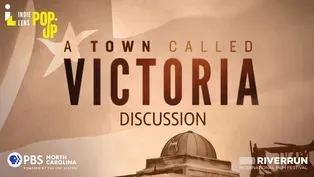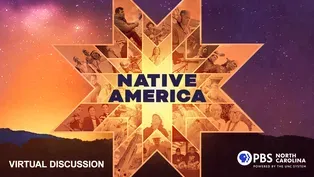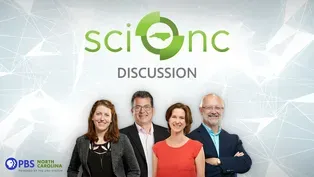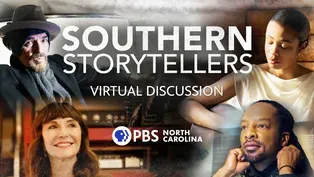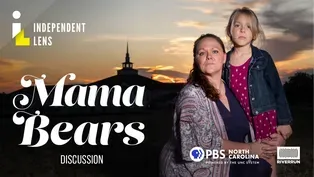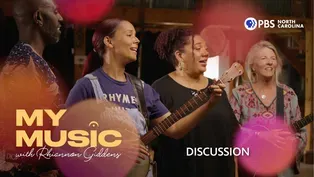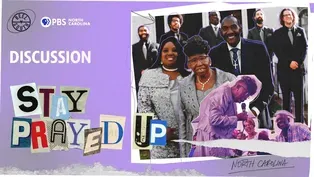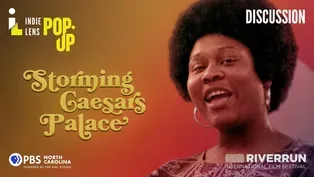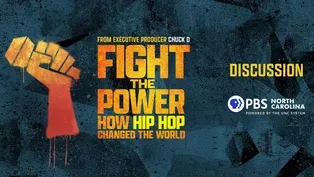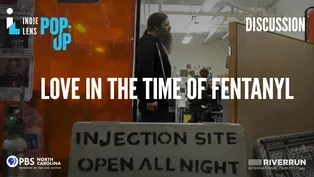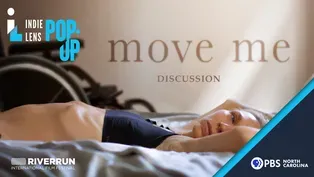PBS North Carolina Specials
Discussion | The Key Ingredient with Sheri Castle
9/20/2021 | 32m 47sVideo has Closed Captions
Lindsay Bierman, PBS NC CEO, chats with Sheri Castle about cornmeal and more!
Lindsay Bierman, PBS NC CEO, sits down with Sheri Castle to discuss the launch of her new show, The Key Ingredient with Sheri Castle. Sheri shares tips on how to season and care for your cast iron skillet, make mouthwatering cornbread, and the selection of this season’s key ingredients and recipes. She also answers the question—does buttermilk really have an expiration date?
PBS North Carolina Specials
Discussion | The Key Ingredient with Sheri Castle
9/20/2021 | 32m 47sVideo has Closed Captions
Lindsay Bierman, PBS NC CEO, sits down with Sheri Castle to discuss the launch of her new show, The Key Ingredient with Sheri Castle. Sheri shares tips on how to season and care for your cast iron skillet, make mouthwatering cornbread, and the selection of this season’s key ingredients and recipes. She also answers the question—does buttermilk really have an expiration date?
How to Watch PBS North Carolina Specials
PBS North Carolina Specials is available to stream on pbs.org and the free PBS App, available on iPhone, Apple TV, Android TV, Android smartphones, Amazon Fire TV, Amazon Fire Tablet, Roku, Samsung Smart TV, and Vizio.
Providing Support for PBS.org
Learn Moreabout PBS online sponsorshipMore from This Collection
Discussion - A Town Called Victoria - Independent Lens
Video has Closed Captions
The filmmaker and former Victoria residents share their story. (46m 51s)
Discussion - Native America Season 2
Video has Closed Captions
Panelists discuss preserving the languages of Native American tribes. (39m 1s)
Video has Closed Captions
Sci NC executive producer and host, Frank Graff, chats about upcoming Season 6 of Sci NC. (26m 6s)
Discussion - Southern Storytellers
Video has Closed Captions
Author David Joy and others discuss storytelling and their new PBS series. (42m 13s)
Discussion - Mama Bears | Independent Lens
Video has Closed Captions
Producer and director Daresha Kyi discusses the film and LGBTQIA+ advocacy. (34m 41s)
Discussion - My Music with Rhiannon Giddens
Video has Closed Captions
Discussing the series with producers Will & Deni McIntyre and country artist Rissi Palmer. (39m 56s)
Discussion - Free Chol Soo Lee | Independent Lens
Video has Closed Captions
Local lawyers, professors and nonprofit leaders discuss wrongful convictions and reentry. (40m 44s)
Discussion - Stay Prayed Up, Reel South
Video has Closed Captions
The filmmakers discuss their journey with Mother Perry and The Branchettes. (45m 4s)
Discussion - Storming Caesars Palace | Independent Lens
Video has Closed Captions
Local professors and nonprofit leaders discuss welfare and the social safety net. (33m 2s)
Discussion - Fight the Power: How Hip Hop Changed the World
Video has Closed Captions
Local experts discuss the history of hip hop with PBS North Carolina. (59m 43s)
Discussion - Love in the Time of Fentanyl | Independent Lens
Video has Closed Captions
Local harm reductionists, therapists and others discuss the opioid crisis and more. (55m 44s)
Discussion | Independent Lens: Move Me
Video has Closed Captions
A dancer with blindness and disability advocates discuss adaptable arts programs. (38m 46s)
Providing Support for PBS.org
Learn Moreabout PBS online sponsorship- Good evening, everyone.
Thank you so much for joining us for this special preview screening of the new PBS NC original program, "The Key Ingredient with Sheri Castle."
I'm Lindsay Bierman, the CEO of PBS North Carolina, your statewide public media network and one of the nation's largest PBS affiliates.
It's our mission to provide transformation, transformative experiences and trusted content to educate, inform, entertain, and inspire the people of North Carolina.
Tonight, we want to connect with you as southerners, North Carolinians, and as Americans with an award-winning food writer and cooking teacher who is known for melding culinary expertise, stella storytelling, and as you've seen some humor.
And famously telling a tale while making a memorable meal.
I had the great pleasure of meeting and working with Sheri When I was the editor in chief and Southern Living back in the early 2010s.
Before I turn it, before I start my conversation with Sheri I just want to acknowledge the show's Emmy award-winning executive producer and director Heather Burgess.
Heather has been telling the stories of North Carolinians and about North Carolina at our station for over 20 years and has worked so diligently to create some of our most iconic programming.
From my home NC to the reason we're all here tonight, "The Key Ingredient with Sheri Castle".
I can't tell you how much I admire her impeccable eye and her extraordinary talent.
That's why I'm thrilled to announce that Heather was recently promoted to Director of Original Productions, overseeing several programming verticals including, but not limited to lifestyle, arts and culture.
Heather will continue to develop, produce and elevate our content in those areas so keep watching and stay tuned.
She is unfortunately unable to join us tonight because she lost her father last week.
So Heather, our hearts go out to you and your family.
Switching gears and without further ado, allow me to introduce you to all of you, our special guest and the star of PBS NC's "Key Ingredient with Sheri Castle", hey Sheri.
- Hey Lindsay, how are you?
Thank you for that generous introduction.
- It's great to see you.
I wish we were in person, I wish we were in a kitchen.
I wish you were showing me how to get a screaming hot skillet full of delicious cornbread, or better yet pound cake.
- We'll do both of those as soon as we are able.
- Okay, good.
I just want to acknowledge, I've got downtown Charlotte behind me virtually.
I am Zooming in from my condo in Cornelius on Lake Norman, I don't know if we've got Cornelius represented out there tonight but hello from, hello from Charlotte.
So Sheri, you know, of course, many people know and love you, you have a lot of fans.
I have so many people that I know in Chapel Hill who've taken your cooking classes.
I know people who've loved your cookbooks.
You have so much experience in the culinary world.
You have so much respect.
Why don't you just take a moment for those who aren't as familiar with your work, you know, to give us a sense of how you got here, what was your culinary journey, so to speak, and obviously your father instilled a love of food.
- He did, a love of cornbread and cornmeal and backyards for sure.
Well, I was trained as a professional writer and I have done that for a number of different industries since I graduated from Carolina, about 110 years ago.
But I, through all of that, cooking was my passion.
It's what I love, you know, it was what I did in terms of relaxation, curiosity, personal growth, and of all things, true story, I wrote my very first recipe, wrote a little story to go with it and drew a picture and mailed it to a TV show when I was four years old.
- What?
- So I think perhaps in hindsight it was destined.
It's certainly been something I have enjoyed my whole life but I would say I turned pro so to speak in about 1998 and I knew then I wanted to be a cooking teacher and a food writer.
And naivety has served me better than ambition 'cause here we are still seeking and telling and enjoying food stories.
- And making so many, so many people happy, you know, through food and through cooking, it's really wonderful.
So, okay, let's talk about the concept, the show, "The Key Ingredient."
You and Heather came up with that, how?
What was, kind of give us a sense of the origins of the program?
- Well, you know, it was good old fashioned brainstorming.
We, it, we did it through Zoom just like you and I are chatting at that time.
And we talked about different things.
I'm, you know, I knew that it was important to me for it to be appropriate for home cooks, that I could take that love of stories and ingredients and techniques that people can use to make them more comfortable and enthusiastic with cooking.
And how do you bring that to a story?
And we were like, oh do we want it to be about this, about this, I'm like no really, my most successful classes and cookbooks and so forth have always begun with an ingredient and it seems like the moment that word came out, we knew we had found, we had found our true north on our compass and started going in that direction.
- So there's no shortage of ingredients, why cornbread?
Why did you start there?
- You know, we say, I said, cornmeal.
- Cornmeal, sorry.
- Heather and I decided that, and the cornbread of course, came right after that, almost simultaneously in thoughts.
When we, we weren't sure how many episodes we were going to make at first, so I came up with a really long list that became a list like this, that became the final list.
And each of these ingredients truly mean something to me.
I mean, I have a personal passion and relationship with them.
I think if there are things people either know very well, but maybe need a fresh perspective or maybe have never given a lot of thought to, and, you know, cornmeal was on my list and Heather asked the very logical question you just did, why cornmeal, I said, well you see my dad and I have this mill that my great-grandpa bought in 1923 and when I got to about that part in the story she goes, okay, okay, got it, got it.
And you know, we had, now, I will say that my dad is not featured in all the episodes, he's great but he's not in all of them, but there was a moment, an aha moment when I was explaining to her why I had such passion for these ingredients, she goes, got it, got it.
And I'm hoping that that will come through in the storytelling that she, she led me through.
- I should know this having been the editor of Southern Living but I need to ask you, and I'm going to apologize if it's a dumb question, but the mill that was in the driveway, are those, is that a common and how's?
- Not any more, it was once common, that mill was produced coincidentally, in North Carolina, that's a lovely coincidence, it was built, manufactured, it's Meadows Mills, is the brand, in Wilkes County, North Carolina.
And it was common in the mountains in that era when people did a lot of growing their own corn, doing a lot of local milling, 'cause not everyone had, you know, the perfect waterway with the big picturesque, mill and so forth, this was more like something people had at home or could take, even though it weighs several hundred pounds, maybe close to a ton, it was extensively portable.
You could put it in the back of a wagon and move it or people could come to it.
So at one time it was common, it is certainly not any more.
I don't believe other than ours, I've seen more than two or three in my whole life and it's usually some sort of a heritage festival or something, so it is, it is a lovely thing that has been passed down through the generations and hasn't always been in use but has been in very active use in the last few years, since I figured out that it was under a blue tarp.
[laughing] - What I love, yeah, that's wonderful.
What I loved about that segment, particularly, I think, I think there, you know, I think we suffer in this age of digital ephemera from a kind of certain blindness to nature and we've lost that sense of connection to the source of our food.
And so when you just see that, when you see that being milled in the driveway, it just sort of reminds you, you know, of the process, you know, and just the, the origins.
And I think that's really, I think, I just think that's really wonderful.
- Well thank you and you know not everyone has a mill as we just discussed and I don't want anybody to think that you have to have a mill or know my dad, although you'd be blessed if you did, either of those things that, to be able to make these recipes.
But my takeaway, I hoped was is that people would say, hmm, I have some choices when I make something, it's sometimes a tiny little choice, I mean, cornmeal, even the best kind is not expensive.
There's sometimes there's those tiny little decision points that can make a difference in how a recipe turns out, our enjoyment of it and if nothing else, it's a tale that you can, you know, you can share with someone else.
- You know, I think you, yes, unequivocally yes, we're not advocating that people go out and suddenly buy mills and, you know, trying to try to find vintage mills.
But I do think it's, it is important to mention that there are many producers I would imagine across North Carolina and I think I'm gonna make a note that we need to make, we may wanna include that on our website for some potentially, for some sources, for some, you know, artisanal cornmeal.
- Exactly, across North Carolina, across the south, really across the country, there has been what I have called through some articles I've written and just in conversation, a sort of a milling Renaissance in the last five years as part of this, you know, paying attention to where ingredients come from, any local connection when that's available and you know, I want to assure people, it's out there and it's often in plain sight and sometimes we just forget to look for something we don't know exists.
- Moving on to the segment with Cheetie Kumar, oh my God, I love Garland, that is such an amazing restaurant.
For our Raleigh viewers, our Triangle viewers, look up Garland, it is just a fantastic restaurant.
I'm not sure if they're currently, I'm not sure if they're currently open, due for COVID precautions, so please check that, but you know, by all means get, take out, it is just a fantastic restaurant.
So I love seeing Cheetie.
How did you decide on Cheetie with again, with so many chefs, people that you can reach out to in the south for that segment, why Cheetie?
- Well, she and I are genuinely friends.
I'm friends from, you know, friendliness to truly close friends with a number of people throughout the season and, you know, given the time of year and the nature of some things, you know, we couldn't go, but so far afield.
So with the exception of one, all of our guest cooks are in North Carolina this season.
And Cheetie and I talk frequently about things and not necessarily about cornmeal, but when I was telling her some of the topics I'm like, will you please be on part of this, because she and I have such, I think, such good rapport, with one another, genuine affection and respect for one another's skills.
And I said, how about this or this?
And she said cornmeal.
I mean, she just lit up when I said it.
And I think I felt that way with each pairing of guest cook and ingredient, when they got the sparkle in their eye, we knew they were the right combination.
- That was wonderful.
Now we have to talk about pound cake.
- Yes.
- Again, so many variations on the theme that looked delicious.
[laughing] - Well, I'd like to think it was, yes, I mean, when I selected these recipes, I did them first for their deliciousness and because I think there are appropriate for home cooks.
And, you know, even if you don't make that exact pound cake, although I believe everyone should give it a go, but I try to include little tips and hints that people can apply to the recipes that they already have.
I've been making that pound cake for years, it's just one that I love.
I think that it's both familiar and a little bit of a twist.
It's not too far field, you know, it's easy to make a keeps for days, you can freeze it and you can eat it for breakfast.
I mean, what more could you possibly want?
- So I noticed in the, during the screening, there were a lot of questions about seasoning the skillet so that was great, that we got to that point, I think the tips and tricks are going to be, you know, a viewer favorite, 'cause you've got some really good tips and tricks up your sleeve and I know from years of teaching cooking classes, any other secrets you want to share or give away before, you know, we've got eight episodes, we've got many more tips and tricks coming up at any, do you want to preview any for us that you know are going to be viewer favorites?
Ask question.
- Well I do agree with you about the the skillet, we have somewhere along the way, people got afraid to, you know, that they were going to ruin their skillet and I always tell people if it were that fragile, we wouldn't have skillets that have lasted for generations, you know, it's all that.
But you know, the tips and hints are a range of things.
There's not so much a theme other than I wanted them to be practical.
So sometimes it's like, how do you store this in the fridge?
How do you pick this out?
If you're at the farmer's market or at the grocery store?
And, you know, you're faced with a wall of pumpkins, which one you'd pick up, you know, how do you season a skillet?
How do you chop this?
So the, the unifying thing is, I hope they did as something that make people either feel validated, because like I knew that, I knew that, which is good, or it's like, who knew?
And I think that anything on that continuum is good for those of us that enjoy either cooking or watching other people cook.
- Who are some of your favorite, I mean, where do you get your inspiration for recipes and recipe development?
I mean, where do you go to, you know, I'd love to know where somebody who's seen everything, you know, goes to find, find inspiration?
- Well, you know, when I do go out to eat, if something is really delicious, I'm like, what is it about this?
Is it the texture, is it the color, is that combination?
What is it about this is delicious and can this be applied to something else?
Sometimes it's things I will see in the farmer's market or see at the grocery store, it's like, oh my God, that is the most perfect blah blah I've ever seen or I've never seen that before, I wonder what you do with it?
And then I think that for those of us that do develop recipes personally, it's almost like songwriting, you get this little riff in your head and it's like, is this good, can I do something with it?
And if I'm lucky, it works on the first try.
Sometimes it takes a couple of tries and sometimes, and this is valid, this is valid for all of us, sometimes it doesn't work, it just was a bad idea, people didn't like it after all and I think that no matter where we are, whether we're creating our own recipes, whether we're following one to a T or whether we're dabbling with it, you gotta kind of just trust it's like, ah, you know, maybe it didn't work out or maybe this is great and I can take what worked about this and apply it to something else.
Here's a little tip in hand.
I tell people all the time, if you were going to the grocery store or a farmer's market, if it grows together, it goes together.
It's why things that come in to see season, like zucchini and squash and tomatoes and basil, or sweet potatoes and pecans, or whatever season it is, generally speaking, mother nature is trying to point us in the right direction.
And if it grows together, it goes together and that can take you a long, long way toward making good recipes.
- If it grows together, it goes together.
That is so simple and so brilliant, I love it, I love it.
We have a question from the audience.
What if I don't have a cast iron skillet?
Can I make authentic cornbread in a regular baking pan?
- Well I think authentic is a tricky word because it doesn't mean the same thing to all of us.
Yes, you can make cornbread.
You're not going to get that same super crispy crust but are you going to get a fragrant tender, beautiful, delicious cornbread out of a cake pan?
Yes, you will, the edges will be a little bit different but it is not a deal breaker.
But I also encourage that everybody should have a cast iron skillet.
I mean, for like $20, you can get one that will be an heirloom you can pass down.
You know, sometimes, sometimes we're, the initiators of a family tradition instead of the recipients of one, so it's not too late.
- It is never too late, indeed.
Okay, this is a question from somebody who is obviously an expert cook.
Do you know why western North Carolina grinds their corn coarse while eastern North Carolina grinds their corn fine?
- I don't know specifically that but I will tell you people generally prefer what they were exposed to growing up, whether that's white corn versus yellow, whether it's fine versus course or whatever.
People generally use a baseline when either they grew up with something or among their first exposures or the first time something delighted them that recalibrates their baseline and they tend to stick with it all along.
- So for the upcoming episodes, why don't you tease us a little bit with some of the other ingredients that you'll be.
- Oh I can do that, I can do that.
And this isn't necessarily the order that they're going to air, but I can do it.
And I always usually get seven out of these, kinda collect asking Santa to name the reindeers, like I know this, I just can't think of all eight of 'em.
But it's apples, buttermilk, cabbage, cornmeal, which you just saw, field peas, muscadine grapes, oysters, and pumpkins.
- Wow.
What do you think is going to be the most, maybe the most unfamiliar to viewers, I'm going to, I have a guess, but what would you guess?
- I think it terms of unfamiliar, maybe field peas even though they're one of the most common legumes in the United States, especially in the American south, there are over 1500 varieties that we can get right now and most people know only black eyed peas.
I think that may be the biggest surprise.
- That's a big surprise to me, 1500 varieties, yes.
- Right.
I think that pumpkin's doing something beyond pie I hope is a pleasant surprise and my big goal with that episode was is for people to not try to eat their jack-o-lanterns.
And I think for my passion, truly a passion may come through in ways people never consider, is the buttermilk episode.
If there is an international ambassadorship for buttermilk, I really hope I'll be considered at the international level.
- Do you think buttermilk, I'm glad you brought that up because I think buttermilk is a really unappreciated, undervalued ingredient and I'm glad you're doing an episode on it.
- Right it is magic, it works culinary magic.
It's inexpensive, it's easy to find, it keeps forever.
And I really, I love it so much and I hope that comes through and I hope that I can tell, not, just taking my word for it's not enough.
I hope that through the recipes I've chosen, what I show the role that it plays beyond just being a wet thing you pour in the bowl, the culinary magic that it can do, that we somehow realize that, oh my goodness, for $3, I can fix a whole lot of things.
And you usually can't fix a whole lot of things for $3.
- Right!
Okay, a couple of more questions for you.
I need to switch back to switch gears back to a few audience questions here.
What is your, besides the skillet, what is your number one go-to utensil you need to have in the kitchen, I'm going to-- - Number one, no other things, I mean a good skillet.
- Okay.
- A pot of some size, like you could boil water in to do pasta, you know, bigger water boiling, a decent sauce pan.
Usually about three quarts, a good knife.
You know, some people have a knife block that has its own zip code, you know, it's got all these different slots and all these different things and some people have, one sad, sorry little knife where the handle and the blade are pretty much the same sharpness.
And then, most of us are somewhere between that.
A good knife, a good chef's knife, a serrated knife, and a paring knife.
There is almost nothing in the broad world of cooking from making a good sandwich to doing multi-course feasts, you cannot do with those three knives and still, one baking sheet, not much, I mean, really, as much as I love equipment, and I do, I mean, I probably have more than I should but almost everything you can that you need to cook, you could carry around in a laundry basket.
- Yeah, agreed, agreed.
What is your favorite use for leftover cornbread?
If there is such a thing as leftover cornbread.
[Sheri laughing] - A couple of things, I'll tell you the thing that two things, one is it makes great, fresh breadcrumbs.
If I have any leftover I'll crumble it up very coarsely, put it in an airtight container and stick it in the freezer.
And if I need a little topping on top of a casserole or something like that, I'll use the cornbread.
Cubes of it make excellent croutons, if you know how to make croutons out of say, leftover baguette or something, you can use cornbread, to go on soup, or to make a panzanella or to go as part of something.
But I'll tell you my favorite use and this is not for everyone, this will tell you again, that I am a child of the mountains, at least originally.
Up there we have this practice of making what we call bread and milk, cornbread and milk, where we crumble our cornbread in a drinking glass, not a bowl, it has to be a drinking glass.
I didn't make these traditions, I just follow them.
So I'll tell you it needs to be a drinking glass and you crumble a cornbread in, and then you put either milk or buttermilk, whichever one you like, and you eat it with a spoon, sort of like eating cereal with milk on it.
And for those of us that grew up with that taste, that is about as comforting as it gets.
And then for those that have never heard of it, they're like, I'm just not going to do that, that is just too odd and I respect either way, but that's my favorite use, but I think if you look at cornbread as your daily bread, like you might look at leftover biscuits or leftover loaf or something, it will broaden what you believe you can do with it.
- Panzanella.
- A cornbread panzanella is absolutely amazing.
- Gosh, I'm going to have to request that recipe from you at some point.
That sounds delicious.
So another audience question for you.
After an amazing cooking and teaching career full of adventures, how did you decide on the recipes and the key ingredients that you did for "The Key Ingredient"?
- Well, as I mentioned a little bit earlier, the ingredients came from a long list.
I started with a list of 24 things that I just jotted down off the top of my head.
And then we narrowed down, you know, to the ones that we did, but I, you know, I did not put anything on there that I don't believe it.
I'm not going to use an ingredient, you know, that I don't have something to say or I don't believe has a story.
For the recipes, it went back to thing, that I wanted to do something that I, did right by the ingredient, you know, that really showcased it in a way that it played a starring role, not just an ancillary role and it's things that I believe that people can make it home, but you know, there's not, you don't have to have a professional kitchen, you don't have to have a sous chef, you don't have to have three rooms to hold the dirty dishes.
They were things that I really believe people could make or can make something similar.
If there was an ingredient or a technique or a something I did in the preparation of all the recipes throughout the season that people can apply to their cooking at home, I wanted it to be useful.
- Yeah, another question, buttermilk rarely has a long staying date or expiration date but you say it lasts forever.
Can I, should I use buttermilk past its expiration date?
- Yes and this is, we're going to get into that in the buttermilk episode but I will absolutely say yes that the, it's a fermented product just like sour cream and creme fraiche and yogurt.
And it, by that nature tends to last longer than so-called fresh things, you know, like fresh whole milk or something.
And that was sort of the, the origin of the whole thing was, is that through the fermentation, those forms of dairy products lasted longer, they also took a richer, deeper flavor and so forth.
But all of this to say is, is that buttermilk when it sits, does separate, you'll get some kind of clear looking liquid, golden liquid on the top and some more solids on the bottom.
If you can shake that back together, that buttermilk is good to use.
So don't let separation or automatically the date on the carton or the bottle, be the, you know, take the place of your good judgment.
If it will shake back together, it is good to use.
And that is often two, three, maybe even four weeks beyond when you buy it.
- Wow, that's great tip.
And I look forward to seeing what we can do with buttermilk in that episode.
And I would imagine it was very common, particularly in where, before refrigeration was common.
- Well exact, that's where it came from is, well, there was two kinds of buttermilk, there was, there were two things that, to which they applied the word buttermilk, one was truly the leavings in a churn, when someone took milk, let it sit out overnight to develop some cultures for flavor and so forth and then churned butter, the leavings of that was buttermilk.
Now rather than letting, just ambient temperature do that, they tend to be more controlled with their culture.
They will add it in predictable ways and predictable amounts but it is in that culturing that like say people start thinking of it as being much closer to yogurt or kefir or quark, or one of those things rather than milk that has gone bad, which is not at all, then again it sort of says, oh, I've never thought about it that way.
And I want people to think about it that way.
- How close is kefir in flavor to buttermilk 'cause I'm starting to-- - Dead ringer, I tell people that if you live in a place where we're good buttermilk is not available and it is impractical to move, then the next best thing that you can do is to buy kefir, they are on a, plain, not vanilla or sweetened or strawberry or blueberry, but plain unflavored kefir and buttermilk are pretty much a dead ringer for one another.
Especially in utility in a recipe.
- I feel like I've started seeing kefir, suddenly, everywhere.
- Yes.
- All right, back to buttermilk.
Can you substitute store-bought for homemade buttermilk?
- Absolutely, you do want a good liquid buttermilk, you know, there are buttermilk powders that you can use in mixes, like making pancakes and things, that isn't too bad for the application but if you're good, if you need liquid buttermilk for a recipe, then store-bought is just fine.
I know how to make buttermilk, I'm obviously obsessed and even I don't make my own more than about once a year, you know, just to make sure I still can.
- Okay, you'll heard it from Sheri, she's obsessed but she still does not make her own.
- Yes.
- Who is the one chef who has inspired you the most in your career?
That's probably tough to answer.
- Wow, that is-- - I'm sure there have been many.
- Oh there have been many.
I can't give you the exact name and that's not hedging it because there are too many, but I will tell you what inspires me when I read someone's work or taste their food.
It is anyone who can give me something I've eaten many times in a way I've never considered it.
You know, maybe by the way it's finished or what it's paired with, that gives me a thoughtful aha moment, it's like, well, look at Cheetie's recipe in that, there wasn't a thing in that gorgeous bowl.
And I'm telling y'all it was so good but there was not a thing in that bowl I have not tasted before but I have never had it in that combination.
And that was truly inspirational for me.
So people that, I say, give me fresh looks at old things I like and for anybody that can work in a story, give me context, say you know, a sense of place or a sense of role in our culture or our family or in our society, closing that and bringing it back around for the role that food plays beyond just being something to eat is what gets me up every day.
I mean, I will never ever tire of that.
And people that also have that fascination and that ability to tell those stories and not only connect dots but show me where the dots are.
All hail, I mean, I just, you know, I will never tire of that.
- We have just a couple more minutes.
I have to ask you though, before we go, before I wrap up here.
Oysters, I think oysters are an interesting, maybe it's slightly intimidating ingredients for people.
- Yeah that's one of the reasons that I did them because I think a lot of people enjoy oysters as, you know, a vacation or a restaurant thing, which is great.
When I go on vacation, I can get oysters too but they are actually so easy to do at home.
They cook in minutes, I mean, they talk about fast food.
Oysters cook in like under 120 seconds.
So I mean, you can't get faster than that.
Because of refrigeration and our proximity to the coast and all that, they're easy to get in good form and I want people to not be afraid of that because I had to get over that hump too, I really did, I mean, when I was growing up we ate oysters once a year in our house and that was for Christmas and beyond that they were just things that you got at fish camps or when you were on beach vacation.
But we live, there are parts of North Carolina, especially around the Outer Banks that is determined to become the Napa Valley of oysters and I want us to get on that quick.
I want us to hop on that train as soon as we can.
- Let's do it, we're going to tune in.
Last question.
Can I substitute orange zest for lemon zest in the pound cake?
- Yes, you can.
You could also do lime or Buddhist hand or Meyers lemons or pink grapefruit, essentially if it is a good fragrant zest, you can swap them out, in equal measure and suddenly instead of making one pound cake, you know how to make six.
- That's awesome.
Sheri, you are amazing, the show looks fantastic.
I want to give the shoutout to you and to Heather Burgess, once again.
Thank you so much for your time, your talent and all of, to all of your, all of our viewers out there, thank you for joining us tonight.
Thank you for logging on and participating.
Do not forget to tune in or stream the premiere of "The Key Ingredient with Sheri Castle" this Thursday, September 23rd at 7:30 PM on our main channel PBS NC.
You can join Sheri every Thursday at 7:30 on PBS NC and online at video.pbsnc.org and I've got one more thing that I have to plug, I wouldn't be doing my job if I didn't.
I know you all sometimes are used to PBS stations doing on air fundraising but I'm just gonna say to continue to make it possible for PBS North Carolina to bring you compelling documentaries, balanced news, informative how to programs and exciting initiatives, a 24 hour, 24/7 kids channel and all of our educational instructional programs and free events like this one, I hope you're inspired to make a tax deductible donation, whatever you can give to PBS NC, safely and securely at pbsnc.org thank you for that indulgence Sheri, thank you again.
- Thank you Lindsay.
- All of our participants tonight for being with us, thank you all so much for your support, Thank you for watching.
- Good night.
- Good night.
